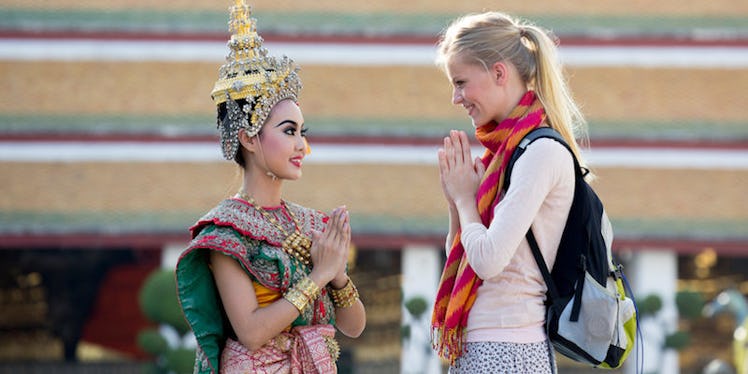
Why Gen-Y Travelers Might Be Silencing Cultures Instead Of Experiencing Them
Throughout our lives as travelers, we often bask in how amazing the experiences are, and how travel can make people more open-minded, worldly and tolerant. But, recent conversations in Cambodia got me thinking about what travel really means for the world.
In Cambodia, as in many other countries, foreign powers are buying land, squeezing out the locals and exploiting the area for tourism or resources. Remote islands are turning into resorts, "pub streets" are replacing local cuisines and tourists are coming in their thousands. Is this kind of foreign intervention and travel just modern-day imperialism? Are the happy Instagram posts and passport stamps just a pretty façade for something less pleasant?
For centuries, wealthy nations such as the UK, the US, France, China, Russia, Germany, Spain and Japan (to name a few) claimed new lands to prosper and gain from. It is an uncomfortable reality for many, but it happened. In the monolithic, modern-day tourism industry, most tourists also originate from such countries. These are rich countries, and consequently, people are often traveling to poorer countries. They want to go to countries where money will go further, where you can “feel like a king.”
With these proportionately wealthy travelers going to less fortunate countries, local economies begin to stop relying on traditional income methods. Instead, they build their lives around the money coming in from tourism. The shift moves from agriculture and other forms of income, and it often moves to subservience for the wealthy foreigners in the form of drivers, hotels and restaurants.
It is not imperialism in the traditional sense of invasion and take-over, but perhaps it is a more subtle version. It's a version where places become so entwined with money from visitors from other nations that it becomes heavily reliant on these greater powers. As people from one of these wealthier nations with a powerful passport, are we guilty of this "travel takeover," too?
Increasingly, it is noticed that it is hard to find a restaurant that does not serve ketchup or a person who does not speak English. It is interesting to hear some conversations from people worrying that regions in their own city heavily reflect a culture different from theirs, but they seem to revel in the fact that their trip to Bali comes with McDonald's, or their visit to Cambodia will be accompanied by Irish pubs. Is this fair?
A possible example of travel as imperialism is the growing use of the English language as a lingua franca. This language is expected to be the medium of communication internationally. Perhaps it is a matter of convenience, or perhaps it is a remnant of an imperialistic past that continues to push its way into modern travel culture under the name of convenience.
Throughout the world (and many of us are guilty of this). you visit a place and automatically say, “Hello.” Or, many people do not think to learn local phrases, and they instead opt for communicating in English. Why is it like this? Shouldn't the onus be on the traveler to learn to communicate with the locals, not the other way around?
Looking at travel is complex, and it's hard to be free from bias and perspective. Some say that travel is born from inequality. It can be argued that travel is often treated as some kind of spectacle where other cultures are there to be benefitted from, and the idea of travel originates from a deep history of conquering rather than learning. Isn't the concept that some passports are more "powerful" than others and that some people are freer to travel than others just imperialism in another name? What about the fact that some can come and visit, travel and become expats in countries, but it is harder the other way around?
The other side of the coin is that travel expands mindsets and helps people become more openminded. The more people travel, the more they understand the diversity of the world, and this eventuates into a more tolerant society. Ideas are shared, globalization increases and more opportunities for interconnection are possible.
Tourism can be seen as a developmental gold mine, increasing the standard of living for many people around the world. Are the losses of language, culture and natural beauty worth it for the increased development?
For us, the jury is still out. Travel is a difficult subject to understand when you look at it deeply and examine more than the feeling of the sand between your toes, street food and the excitement of the unexplored. Asking questions about why we travel and why only some people can have the privilege to turns up many varying opinions.
I honestly wish everybody had the privilege because I have had some amazing experiences, but the reality is, everybody does not. Perhaps this is imperialism under a different name. That large movements of certain groups of people can come to countries and impact upon the culture, but it does not happen as much in the reverse.
Instead of coming by boat, imperialists now come by plane with a camera in hand. They're called "tourists." Perhaps the companies from superpower nations are the modern-day emperors, and the vulnerable countries are now trapped in subservience.
We do not know, and maybe we will never understand. For now, we will just try our hardest to move through countries and landscapes without leaving our own footprints. We need to observe, listen and share, but not force our own culture, business models and ideals upon others just trying to live theirs. The world is a wonderful thing, and it's here to be enjoyed, not taken.
This article was originally posted on the author's personal blog.